
Tyr will help you if - and only if - your cause is just
Ok, folks, this guy, Tyr, and all these runes are pretty cool, no doubt, but are they really relevant to us today? As an individual, as a people, and as a country, the strengths of Tyr are much to be desired. Honor, justice, leadership and authority...do we teach these things to our kids? Depends on the teachers, doesn't it? And everybody in our kids lives are teachers. You and I had quite a few teachers, too. We had our parents, our educators, our neighbors, friends, co-workers, that guy in the grocery store (what? You didn't have him, too?), some had scout leaders, ministers, policemen (and I won't ask about that), relatives, etc. ALL are teachers. And think about all those teachers for just one person.
Now, multiply one of your kids, or yourself (the number should be pretty close to the same), by about 300 million. Now we're talking! US population! Ding, ding, ding! The good ol' United States of America! Does the United States have those same noble qualities of Tyr? Do we know where our true strengths lie as a nation? Is there a willingness to self-sacrifice? If we are wrong, do we say so and accept the consequences? Does America have honor, justice, leadership and authority woven within its very fabric? If you are in a different country, do you feel your country has honor, justice, leadership and authority?
Well, dang, how can you tell me if we, as a people, have these qualities if you only know the basics about Tyr! Just for you, and no one else, a little background. Read on, please:
Who is Tyr - Tyr was the Norse warrior god. Tyr's Germanic name is Tiwaz, the suffix -az meaning god. Tei is linguistically related to "Zeus," and means "sky" or "light." One of the Vikings' names for the North Star was "Tir," which was throught to be at the top of the world

axis, which "keeps the cosmic forces in polarized order," according to Ralph Metzner, writer of Well of Remembrance (which tells of some of the mythic roots of the dominance of the Western culture's worldview; and how many individuals, tribes, and nations are struggling to free themselves from the residues of the ideological oppression practiced by what they see as Eurocentric culture.) Since Norse dragonships and merchanters steered by the stars at night, the god Tyr was associated with the ability to guide, and with the qualities immortalized in Shakespeare's phrase, "fixed and constant as the Northern star."
A man who was considered extremely knowledgeable was called 'Tyr-wise." He was considered the boldest and most courageous of the Norse pantheon. Warriors carved his name into their swords. He was the dispenser of justice and connected to oaths, and the means by which we maintain justice and uphold the social contract. He always spoke the truth. Tyr was born to this role and he knows his role well.
Tyr is an aristocrats' god, a deity of the officers. He is the master strategist in the battlefield chess game and he understands what it is to have responsibility for the fates of many others.
What did he do?
 Tyr was well known for the story involving Fenrir, which resulted in the loss of his sword hand. That's pretty major. Apparently there was this giant wolf named Fenrir, who was one of the sons of Loki, the trickster god who was first welcomed and then betrayed by Odin. Odin had Fenrir's mother, Angrboda, killed out of fear of the powerful children she was bearing, of whom Fenrir the Great Wolf is one. Fenrir was pretty angry at this and rises up in wrath. He tears a heap of destruction all across the countryside, eating everything and everyone in his path. He is so strong that no one can stop him! An angry force of rage and fury!
Tyr was well known for the story involving Fenrir, which resulted in the loss of his sword hand. That's pretty major. Apparently there was this giant wolf named Fenrir, who was one of the sons of Loki, the trickster god who was first welcomed and then betrayed by Odin. Odin had Fenrir's mother, Angrboda, killed out of fear of the powerful children she was bearing, of whom Fenrir the Great Wolf is one. Fenrir was pretty angry at this and rises up in wrath. He tears a heap of destruction all across the countryside, eating everything and everyone in his path. He is so strong that no one can stop him! An angry force of rage and fury!Fenrir was SO strong that no chain could hold him, so the dwarves made a magical rope called
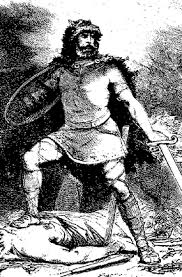 Gleipnir and it was made out of six impossible things - the roots of a mountain, the spittle of a bird, the beard of a woman, the footfall of a cat, the sensitivity of a bear and the breath of a fish. Each of these items has a metaphorical meaning and put together become a recipe for stopping the World with a series of little, inconsequential, gentle things.
Gleipnir and it was made out of six impossible things - the roots of a mountain, the spittle of a bird, the beard of a woman, the footfall of a cat, the sensitivity of a bear and the breath of a fish. Each of these items has a metaphorical meaning and put together become a recipe for stopping the World with a series of little, inconsequential, gentle things. The gods promised that once they saw whether the rope could indeed bind him, they would set him free, but Fenrir was suspicious. Wary, the wolf asked that one of them put a hand between his jaws as a token of good faith. No one spoke or moved, until Tyr slowly put his right hand in Fenrir's mouth. The dwarves' rope held, but Tyr lost his right hand at the wrist—the wrist was called the "wolf joint" in Old Norse.
The gods promised that once they saw whether the rope could indeed bind him, they would set him free, but Fenrir was suspicious. Wary, the wolf asked that one of them put a hand between his jaws as a token of good faith. No one spoke or moved, until Tyr slowly put his right hand in Fenrir's mouth. The dwarves' rope held, but Tyr lost his right hand at the wrist—the wrist was called the "wolf joint" in Old Norse.Pretty cool guy, huh? Gave up his sword hand to protect everybody from the "angry force of rage and fury" that was devouring the countryside. How many of you would self-sacrifice to that point? Hmmm...not many hands up. How about for grandma? Oh, come on now! How about for your kids? THAT's better! David! You've got to decide, man. Either up or down!
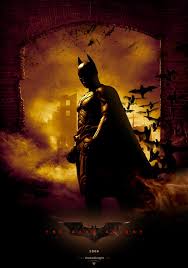
Honor, justice, leadership and authority. Analysis, rationality. Knowing where one's true strengths lie. Willingness to self-sacrifice. Victory and success in any competition or in legal matters.
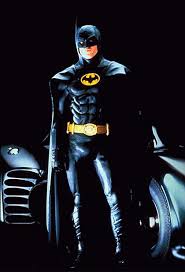
Who is Batman - I wasn't as familiar with Tyr when I started this article and considered an embodiment of justice that we ALL would be familiar with would be closer to Batman, the Dark Knight, the Caped Crusader. Batman is a graphic novel hero, but he is also a modern day legend. A figure of strength and an unflinching symbol of justice. He is his own judge and jury, but never the executioner. In fact, he avoids carrying a lethal weapon, although he has killed (not in continuity).
He has a willingness for self-sacrifice. He has sacrificed every bit of his own humanity to become what he is. If he stops his crusade of justice, he is no more. And all he is, is the Batman. Batman sacrifices his humanity, but he also sacrifices his soul. He can never be "normal." He can never experience what it is like to be a part of a family. He can't trust others beyond a close few to his true identity. He and his alter ego, Bruce Wayne, remains clothed in shadow.
What does he do?
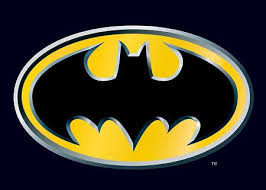 Fights for truth and justice. He goes where the law cannot and exacts justice upon those that deserve it. He is a vigilante hero. But remember, he is still a vigilante, nonetheless.
Fights for truth and justice. He goes where the law cannot and exacts justice upon those that deserve it. He is a vigilante hero. But remember, he is still a vigilante, nonetheless.As Lt. James Gordon states when asked by his son why Batman is running, "Because he's the hero Gotham deserves, but not the one it needs right now. So we'll hunt him because he can take it. Because he's not our hero. He's a silent guardian, a watchful protector. A dark knight."
How are they similar?
They are both avengers of justice, and judgment. Both experience self-sacrifice, both pay a price to obtain their goals. They are both warriors and vengeful destroyers of evil.
Both act with authority. Tyr has natural authority. He is a god, for Pete's sake! But he carries that authority with responsibility and honor.
The Bat has authority, but it's self-proclaimed. He's no god. He claimed authority to do justice. And he wears it in vengeful silence, in memory of his parents.
Both clearly know their true strengths.
So, what's the difference?
 VS.
VS. 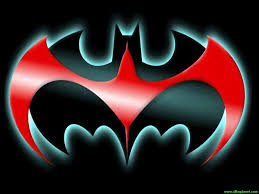
The biggest difference in the defining characteristics between Tyr and Batman is that despite the fact they have the same goal, they go about it by different means. Tyr goes forward embodied by the law, but Batman is hindered by the law, and has, at times, gone beyond the law.
Their methods of upholding justice, and how they inspire those around them differ. Tyr upholds justice through the law, Batman upholds the law through justice. Tyr inspires heros around him, showing them bravery, courage, and proper judgement. Batman inspires fear in crooks and villains to do the right thing, to not commit crime. The Batman is always waiting around the corner, in the shadows. Batman does not intend to inspire others to be like himself. Batman is unnerving and unflinching in his actions, whereas Tyr is bold and charismatic.
Why is Batman considered a hero in today's society if he is hindered by the law? Why does he act outside of the law? Does he see himself as a more effective tool? How many of us flock to movie theaters to see Batman serve justice to the bad guys?
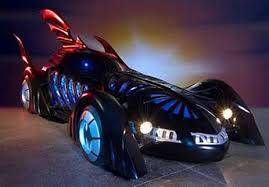 I can see my kids relating much better to Batman than that OLD guy. The Bat fights against current bad guys. He wears black (big one with MY kids, 19 & 22 years old). Let's add on a cool costume, really cool weapons and devices, and really, really, really cool vehicles.
I can see my kids relating much better to Batman than that OLD guy. The Bat fights against current bad guys. He wears black (big one with MY kids, 19 & 22 years old). Let's add on a cool costume, really cool weapons and devices, and really, really, really cool vehicles.But, to be fair, let's ask the same questions of Batman that I asked of Tyr.
Is Batman's qualities relevant to us today? As an individual, as a people, and as a country, are the strengths of Batman to be desired? Does he have the same qualities of honor, justice, leadership and authority as Tyr that we find noble and that which we value? And riddle me this, would you rather go see a movie about Tyr, ripping into bad guys, or a movie about Batman ripping into bad guys? Which of the two should be our standard bearer?
You tell me.
Do we as a nation display the characteristics of Tyr? How?
or
Do we as a nation display the characteristics of the Dark Knight? How?
(Oh, I know there are different nations within Gather, so you don't get off by saying this is only for US citizens. Yeah, I'm talkin' to you!)
A collaborative body of work
Produced in The Gestalt Project.


No comments:
Post a Comment